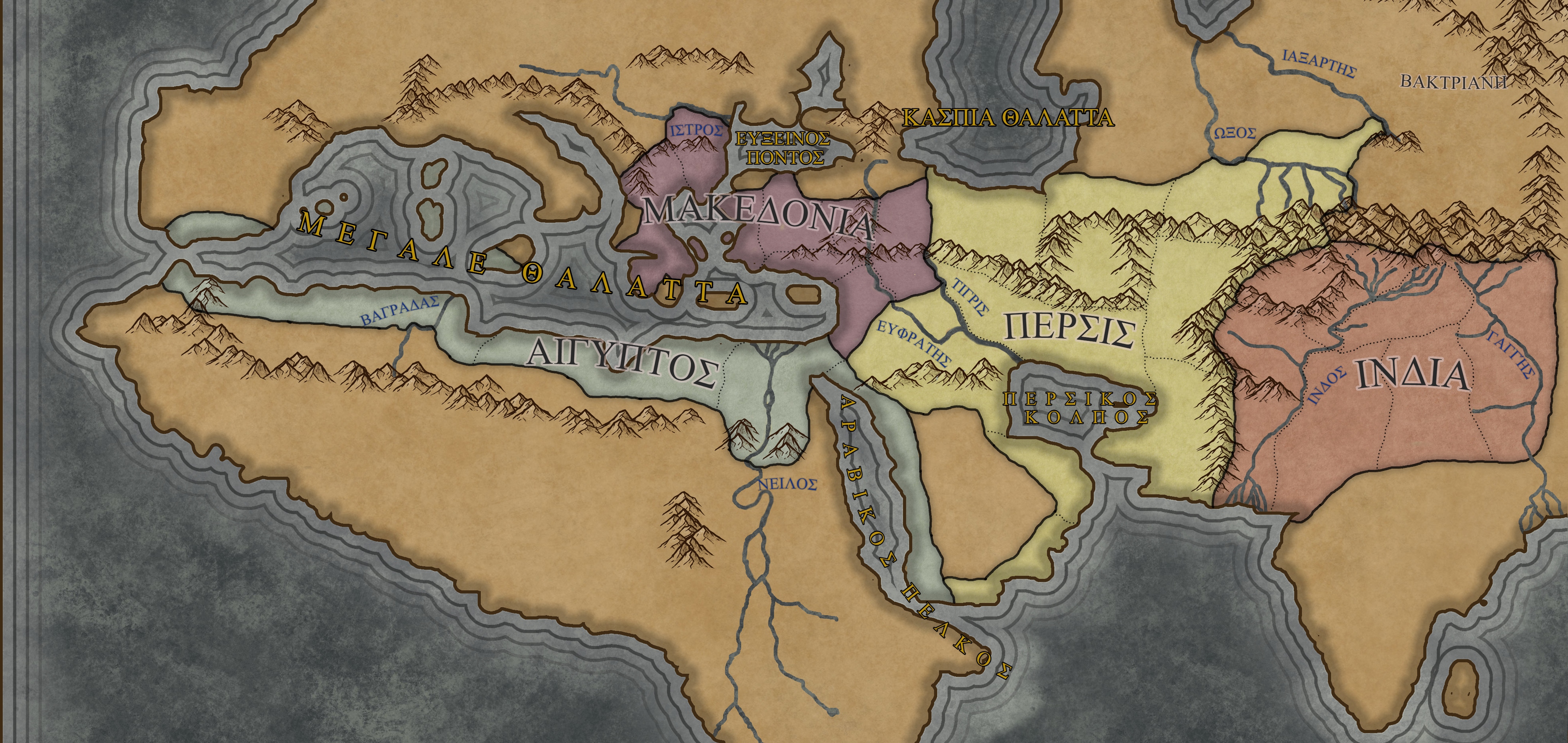Education
For a large part of his education Alexandros was thought in Mieza by the famous philosopher Aristoteles. Here he bonded with other Macedonian nobles such as Ptolemaios, Hephaestion and Kassandros who would become his future friends and generals. The wise Aristoteles thought them about religion, logic, art, philosophy and medicine. But one work of literature stood out for Alexandros, the illiad, the story of the ancient war between Troia and the Greeks. It is said that the copy that Aristoteles gave him travelled with Alexandros on all of his campaigns.
Personality
Alexandros' father, Philippos II, likely had a strong influence on his personality. Seeing his father's many victories made Alexandros ambitious and ever hoping to achieve more. His mother encourged this even further, making him believe he was born to rule Persia. Little did they know that Alexandros would even go beyond their wildest dreams.
He was known to be intelligent, calculating, an avid reader and patron of the arts. However, he also had flaws as he could be impulsive and quick to anger at moments, which was not always the best during battles. But above all he was a capable leader, perhaps the best known to us. If he were alive once more what would he think about the leaders who let our united Greek Empire crumble.
Relationships
Alexandros married three times but Roxana was the real love of his life. Only after defeating the Persian Empire did he meet this Bactrian princess. Although he did not have children early in life, Roxana gave him his heir Alexanderos IV and his daughters Cleopatra and Arete. When Alexanderos finally defeated they Mauryan Empire of India his son was there, learning all he could from his father.
From his group of friends Hephaestion was by far the most important as they could seldom be seperated. Some would claim that his love for Hephaestion was deeper than usual. To that I say stop gossiping about things we can't know for certain, besides even if it were true he would not be the only one in history to do so.
Personal History
Macedonian Heir
At the age of 16 Alexandros already had some combat experience from serving under his father and was even briefly a regent while his father was away on another conquest. When he returned both father and son fought against the Thracians and Illyrians after which they set out for Greece. Through their swift victories there they managed to create a Hellenic Alliance with Philippos II as Hegemon. For the first time in history the majority of Greece was united under a single leader. Only Sparta did not want to join this alliance but was left alone despite their ill fated response. After he consolidated power in Greece Philippos made preparations to start the invasion of Persia, a war he would never participate in.
Shortly after their success Philippos remarried making the position of Alexandros a bit more precarious. After a drunk feud at the wedding Alexandros and his mother went temporarily into exile. After six months, however, they returned once the situation calmed down.
See there the man who makes preparations to pass out of Europe into Asia, overturned in passing from one seat to another — Alexandros III after his father tripped during the feud
Philippos would never see his invasion plans succeed, however, since he was assassinated at his daughter's wedding. From then on Alexandros III would be named king, set the stage for a Greek controlled world.
King of Macedon
The early years of Alexandros' rule were not without problems. All those who could oppose his succession were executed either by Alexandros himself or his mother. Philippos III was left alive as he was considered to be mentally disabled and thus not a real threat. But there were also problems to the south. Many Greek city states revolted after Philippos death which forced Alexandros to march his armies there.
But just like his father he proved to be worhty of the title of Hegemon. After his first success the northern borders became his next target. The Thracians and Illyrians never stood a chance. When the Greek city states rebelled once more Alexandros decided to raze Thebes. This act made the other city states think twice before opposing Alexandros. With Macedon once more secure Alexandros left to conquer Persia leaving Antipatros as regent.
Unlike many others the philosopher Diogenes of Sinope did not reach out to meet the Alexanderos when he arrived in Corinth. Therefore Alexandros went to the philosopher himself and asked what he could do for the man. Diogenes replied "Yes stand a little out of my sun." The Hegemon was so impressed by this response that he later said to his men "But truly, if I were not Alexander, I wish I were Diogenes."

by kefkejaco with midjourney

King Darius flees the battlefield by kefkejaco with midjourney
Yours will be the empire of the world, as it is the will of thine immortal father — Oracle of Siwa
Persian Empire
Two years after his coronation Alexandros started his conquest of the Persian Empire by crossing the Hellespontos. Once across he threw a spear into the soil saying that he accepted Asia as a gift from the gods. After his first victory against the Persians in the battle near the Grenikos river he had set his first step on fulfilling his destiny.
When he travelled to the Phrygian capital of Gordium Alexandros encountered the unsolvable Gordian Knot. Only the future king of Asia would be solve it. After seeing it could not be done by ordinary means Alexandres drew his sword and cut the knot in two. Thus the prophecy was fulfilled.
From there he set out conquering the Ionian coast and finally freeing the Greeks their of their Persian oppressors. In the battle of Issos the Persian King Darius III and Alexandros met for the first time. And despite being outnumbered the Macedonian army claimed vistory. Seeing them achieving the impossible, the cowardly Darius fled as his army collapsed. After their defeat the Persians offered a peace treaty but Alexandros refused as he would conquer all Asia.
Egypt
After successfully conquering Syria and the Levant Alexandros set out to invade Egypt where he was seen as a liberator. During their rule the Persian occupiers neglected many of the Kemetic temples, a crime that Alexandros would correct. He restored the temples and even erected new monuments for the Kemetic gods. As his army marched through the desert they came upon the oracle of Amun-Ra in Siwa. Here Alexandros' divine origins became once and for all clear as his was referred to as the son of Zeus-Ammon.
Persia
Once more Alexandros and Darius met eachother on the battlefield at Gaugamela. And once again Darius fled in defeat. With the road to the east cleared out Alexandros captured Babylon while Darius himself fled to Ekbatana. As he marched into the ancient city the people went out to greet him and his was welcomed as the new king. So great was their veneration that they carpeted the road into the city with flowers and garlands. Reluctantly Alexandros eventually left Babylon for Susa and finally the Persian capital Persepolis.
Alexandros chased Darius to the east but the Persian king was captured by his Bactrian satrapes Bessus. After killing Darius he proclaimed himself to be the new ruler of the Empire. This of course did not sit well with Alexandros who set out to defeat him, conquering many new lands in the process.
Alexanderos III Conquests
This map shows Alexandros III various conquests.
First Indian Campaign
Alexanderos was not content after the defeat of the Persians and travelled further east as their were still lands to conquer. His armies marched into India where they fought several fierce battles but were able to conquer the northern Indus region. Although he wanted to continue his conquest up to the Ganges river his army had grown tired and refused to continue. Had he continued he would have conquered the Nanda Empire to the east but alas destiny had other plans. Alexandros then set out to conquer the southern Indus region and returned to Babylon.
Carthago
Once in Babylon Alexandros prepared for a series of new campaigns. He sent Krateros to Macedonia with the veteran soldiers who could finally see their families after years of conquests. Antipatros, the regent of Macedonia, on the other hand was to join him in Babylon with new troops. During his time in Babylon a plot was discovered to poison Alexandros. Alexandros was furious and ordered his men to get to the bottom of this. The Carthaginians were the ones to blame, as they feared that their lands would be conquered next. By trying to avoid their fate they sealed it. Before continuing west, however, Alexanderos marched his fresh troops to the western coastline of the Arabian peninsula in order to secure the naval trade routes towards the Persicus Sinus.
From Egypt Alexandros marched his armies ever further to the west until he reached the Carthaginian territories. Although his early victories were quite easy he eventually stumbled upon a large force when he neared Carthago. But Alexanderos never shied away from a challenge and emerged victorious. Once the city fell it was renamed to the Greek name of Alexandria Karchedon, punishing the Carthaginian even further for their insolence. But the conquest of the city brought a secret to light. The Carthaginians had sailed past the Pillars of Herakles and reached new lands across the ocean. Intrigued by this news Alexandros marched his armies further.
After reaching the pillars of Herakles he conquered the last remaining Carthaginian settlements. Seeing the vast ocean before him Alexandros was uncertain if he should continue and decided to set his sights on the east first. But during his campaign to the west the Indian Nanda Empire had been overthrown by Chandragupta Maurya who posed to be a threat to the newly acquired territories.

by kefkejaco with Midjourney
Second Indian Campaign
With his sights once again set on the east, Alexanderos wanted to secure the entire region around the Persicus Sinus. After already successfully conquering the Arabian west coast the rest of Arabia proved to be no challenge. The more difficult battles were still ahead, however, as Alexandros decided to once again march into India.
A lot had changed in India in his absence during the rule of Chandragupta Maurya, a much more popular leader. He proved to be serious threat to the Macedonian regions in India. By the time Alexandros returned to India, Chandragupta Maurya had reclaimed several regions around the Indus. The first battles between the two leaders were fierce but eventually Alexandros managed to oust Chandragupta out of the Indus region.
During the long war new tactics were used such as the addition of elephants to his army. Eventually Chandragupta was pushed back to the Mauryan heartlands around Pataliputra near the Ganges. Once Alexandros claimed this city his victory in India was complete. He was, however, heavily wounded during the final battle and was halt further conquests. His last act in the region before returning was appointing new satrapes and founding the city of Alexandria Ganges close to Pataliputra. On is return to Babylon he decided to consolidate his rule for a time and implement some reforms until his health would improve.
Reforms
One of the main reforms that Alexandros implemented on his return was the creation of the Megas Satrapes. As the empire had gotten so large it became difficult to manage. There were already satrapes for smaller regions but a more unified rule was need for larger regions. And so the empire was divided into four larger sections: Macedonia, Persia, Egypt and India.

Megas Satrapes division by kefkejaco with Inkarnate
The first Megas Satrapes were taken from Alexandros most trusted followers:
-
Makedonia: Krateros, regent of Makedonia
-
Persis: Kassandros, son of Antipatros
-
Aegyptos: Ptolemaios I Soter, general of Alexandros
-
India: Perdikkas, general of Alexandros
In his great wisdom Alexandros decided to ease religious tensions as well. Practitioners of Zoroastrianism were actively shunned during his conquests and many of its temples were destroyed. Feeling remorse for these earlier deeds he restored many of the temples and allowed the Magi to practice their faith once more.
In India Hinduism became ever more intwined with the Hellenic pantheon. For Alexandros this was a perfect opportunity as the new hybrid that started emerging pathed the way for his own deification in the region.
Dynasty










Good comprehensive history but a bit dry. I'd mix in a few supposed quotes and famed encounters - like Diogenes.
Was thinking of doing that, good suggestion.